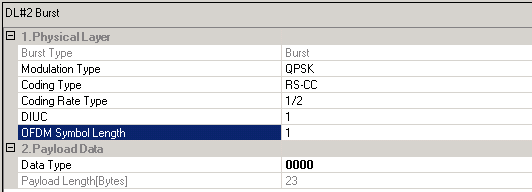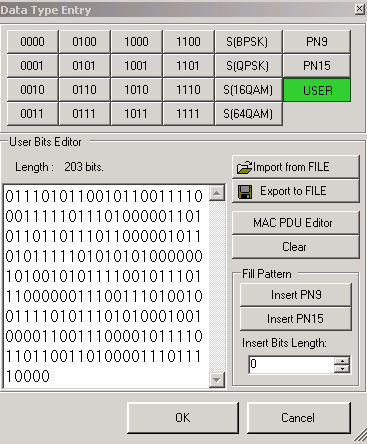
To access either the downlink or uplink burst editing window:

In the tree view under
Physical, click the burst you wish to edit.
or
Click Physical to display all previously
added bursts in the right pane. Double-click the first column of the burst
you wish to edit.
This cell displays the burst type. You cannot edit this cell.
Use this cell to select the modulation type. The default is QPSK.
Consecutive bursts can use modulation different than previous bursts. The standard recommends that downlink bursts should be transmitted in order of decreasing robustness, e.g., QPSK is less robust than BPSK, QAM is less robust than QPSK.
Use this cell to select the coding type. The default is RS-CC.
|
RS-CC |
Data is randomized, RS-CC encoded, and interleaved according to the standard specifications. |
|
RAW |
Data is mapped to the OFDM user carriers (192 carriers per OFDM symbol) without any randomizing, encoding, or interleaving. |
Use this cell to enter the DIUC (downlink burst) or UIUC (uplink burst) from 0 to 15. The default is 1.
Use this cell to enter the number of OFDM symbols in the burst. The maximum value is determined based on Frame Duration, Bandwidth, and G (CP time) that you set in the WiMAX Parameters in Project Property.
Click Data Type and the down arrow to access the Data Type Entry window.

|
Select 4-bit data patterns, test sequences, or user-defined data for the payload data type for the MAC PDU. | |
|
Click USER to activate the User Bits Editor in the bottom half of the Data Type Entry window. Type directly into the available space, copy/paste data using Ctrl-C/Ctrl-V, import the data from a file, or create a MAC PDU sequence with the MAC PDU Editor. The maximum bit length of user data is 349,056 bytes or 2,792,448 bits. |
This cell displays the length in bytes used for the modulation on the physical layer. It is coupled with Modulation Type, Coding Type, Coding Rate Type, and OFDM Symbol Length. You cannot edit this cell.